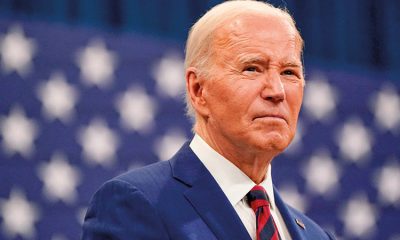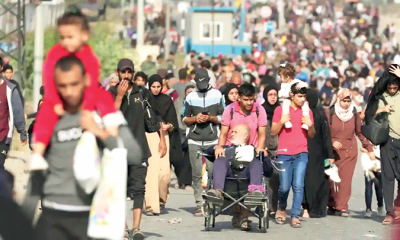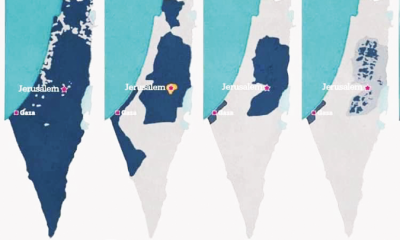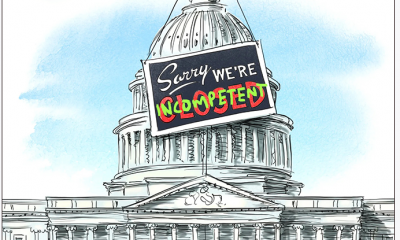Features
Prime privatisation; vandalism in Paradise Lost

Cassandra received an email a couple of days ago, parts of which she quotes below, after googling to verify facts.  A news item on Monday 24th moved her hand to do this; the news being that Sri Lankan is flying at a loss. No surprise; known for a long while. What stunned Cass, however, was the billions of debt incurred for these three months of the year. In contrast see what India has done. India will be hosting the 2023 G20 Summit of 20 member nations in New Delhi in September and Biden is scheduled to visit the country. Yes, VIP nations are scrambling to further good relations with India, with respect to the country and its economic advancement. On the other hand, the Teardrop that hangs at its bottom from being serendipitous and doing well, has been pushed to be a failed state, looked askance at, or if pitied and considered worth being charitable to, treated with a handout or two.
A news item on Monday 24th moved her hand to do this; the news being that Sri Lankan is flying at a loss. No surprise; known for a long while. What stunned Cass, however, was the billions of debt incurred for these three months of the year. In contrast see what India has done. India will be hosting the 2023 G20 Summit of 20 member nations in New Delhi in September and Biden is scheduled to visit the country. Yes, VIP nations are scrambling to further good relations with India, with respect to the country and its economic advancement. On the other hand, the Teardrop that hangs at its bottom from being serendipitous and doing well, has been pushed to be a failed state, looked askance at, or if pitied and considered worth being charitable to, treated with a handout or two.
So here quoted is a para or two from the email received. “Air India announced on February 14 that it had placed orders for 470 Airbus and Boeing aircraft. It is being touted as the largest purchase in commercial aviation history.” (Monday 24 Lankan news said most of Sri Lankan planes, on loan, were undergoing repairs).
To continue quoting, “This is a classic story that highlights the transition from a state-owned loss making, corrupt and inept organisation to a private entity that has assessed the market and has made acquisitions to build up the business… India’s national carrier, Air India, was officially handed over to the Tata group on January 2022. The handover ends a years-long attempt to sell Air India, which has raked up losses worth $9.5bn. The national carrier was founded by JRD Tata in 1932 and nationalised in 1953. The acquisition is the country’s most high-profile privatisation under PM Narendra Modi and ends decades of losses and bailouts for Air India.”
Over here
And what pertains in this country apart from Sri Lankan Airline’s flabbergasting losses? A sinister drama involving a past AG who dared say there seemed to be a hidden hand in the Easter 2019 attacks on churches and hotels. He and his home have been targeted by, it has to be assumed, goons ordered by someone high up.
The second most pressing issue is obtaining compensation from the owners of a ship loaded with nitric acid and plastic catching fire and sinking in our most precious sea. The Minister of Justice himself has given info he got that directs to an act of corruption that is almost impossible to believe: that someone or some group wanted to reduce the amount asked for in damages and earned a tidy pile of dollars, supposedly deposited in a bank in England. Far too complicated for Cassandra to even comment on. A claim for damages properly put through could have got billions of dollars to our Treasury because our sea was vastly detrimentally damaged. Cass’ only comment is that not even the devil himself, Satan or Mara would do the bankrupt country such damage as to have the amount sought in compensation, and given, reduced. So, if what the Minister was told is true, there walk and live (well we suppose) Sri Lankans who are worse than the devil in whatever manifestation he appears.
Very probably these two serious issues will remain unsolved. Who loses? Sri Lanka and its people. Who gains colossally? Your guess is as good as poor Cassandra’s.
General lack of public spiritedness
The term ‘public spiritedness’ is here used by Cass to mean “having or showing active interest in public welfare or the good of the community.”
Steering clear of political happenings and dangerous ground, Cassandra moves to a subject that needs to be impressed on people. It is the total lack of public spiritedness which connotes disregard for public property – its correct use and care given – that has to improve. As school kids we had it dinned in our heads to have respect for public property which meant proper use of utilities provided, with care and caution not to damage in any way. I still clearly remember our first Ceylonese Principal in our Kandy school announcing at the school assembly that every student should be public spirited and for example, use a toilet and vacate the room spotlessly clean and with not even a drop of water on the floor.
Cass has often complained about noise and misbehaviour in places of worship, more especially of Buddhist veneration. The precincts of the most sacred Bo Tree in Anuradhapura are never silent; either kapuralas are chanting asking for favours for supplicants from god knows where. The Bodiya is to be venerated in silence; Buddha’s enlightenment remembered with gratitude; and reflection on one’s seela and Samadhi. Often poojas in the vihara below are loudspeakers blasting whatever little quiet there is.
I narrate two stories relevant to prove how badly people use public amenities and spaces.Two nieces braved a pilgrimage to Anuradhapura by public transport. The air-conditioned bus was fine. On reaching their destination, they needed to freshen up. Intending to go to a hotel they saw a very well-facaded set of public toilets. So, they decided to go in. The outside was completely fallacious as regards the inside. It was originally fitted superbly but within, toilet seats were broken, flushes damaged, the ground wet and atrociously smelly. A large mirror was badly cracked. The surmising was that only a deliberate act of vandalism could cause such damage to it.
The next story involves is what a European diplomat in Sri Lanka; narrated to me, hence believable. He and his driver were travelling to Nuwara Eliya, when they had to be behind an open vehicle that was carrying merry makers. The men were seen to be drinking and the women and kids singing. Then one man threw an emptied arrack bottle to the tea estate beside the road. The diplomat, highly angered, ordered the driver to overtake the vehicle which took some time on that hilly terrain. Once overtaken, he ordered that the vehicle be blocked. Mr DPL got down, went up to the van and told them they had to retrieve the thrown bottle and that if they did not do so, he would get the police to helicopter to the spot. Consternation resulted with the men becoming restive and the woman shouting at them to do as told. Both vehicles turned back and the bottle was retrieved. Conclusion is a question. Did the men learn a lesson and dispose of litter in a correct manner thenceforth? Not possible to believe since this careless use of public amenities and even space is ingrained and imbibed in our people from birth.
Sri Pada is a spot of sanctity, beauty, sheer majesty and popular during its season. After the season the area is combed to collect and dispose of rubbish carelessly flung aside. Hillocks of trash are made; such the indifference of people to the environment and keeping premises clean. Pickpockets too are co-trampers up the hill, such that hundreds of emptied purses are found strewn in the underbrush below.
When will Sri Lankans learn to keep their environments and surroundings clean and free of carelessly flung rubbish? Does it have to take strict authoritarianism to insist on decency?
Welcome news items
Heartening news was that a brand new, posh OPD section for the general hospital was gifted by the Govt of China. Great relief when the Chinese Ambassador said it was an outright gift from his great country to us poor failed state. How very sad that last is, but true, driven to it by satanic political leaders and top administrators. Here the Chinese helped with immense loans being given.
A most heart-warming news item was US Ambassador who is ever moving and mingling with common folk, Julie J Chung, graciously chatting and showing genuine amity meeting farmers and, more specially their wives, in Anuradhapura. A woman farmer said that due to the huge America gift of fertiliser delivered to them, the next harvest would assuredly be bountiful.
That is the way matters must be done: give in kind to the needy people: patients and farmers in the two bright news above. Never give money through high ups. There is a rampant disease among them called corruption. Only minus is that when this disease takes hold, the person thrives, girths increase and they live happy as ever. Cass adds – notwithstanding our curses.
Ambitious octogenarian
President Biden has announced his plans to run for re-election in 2024. If he wins, he will be 82 and 86 when his term ends. Trump who has also announced his candidature is close in age – 78 in 2024. Biden is already the oldest to be Prez. He is said to be a ‘healthy, vigorous 80-year-old’ although he has been treated for this and that including a slow growing skin cancer. He has had no major medical problems; doesn’t smoke or drink and exercises regularly. But very recently he was camera caught napping during important meetings, even when the Russian diplomat was addressing the UN.
Does this mean there is no chance that a descendant from an Indian parent will be head of the US, matching how it is across the Atlantic in the British Isles? In any case her popularity has declined, it is averred.
Features
Pluralism and democracy increasingly targeted in US

 If anti-Semitism is indeed on the rise in the US’ seats of higher learning and elsewhere in the country, the federal and state governments of the US are obliged to stamp out by non-coercive means such divisive tendencies without delay. This is in view of the US’ status as a foremost democracy of the world.
If anti-Semitism is indeed on the rise in the US’ seats of higher learning and elsewhere in the country, the federal and state governments of the US are obliged to stamp out by non-coercive means such divisive tendencies without delay. This is in view of the US’ status as a foremost democracy of the world.
Anti-Semitism and other forms of racism run antithetical to the principles of democracy and governments claiming to be democratic have no choice but to ensure that such blights do not take root in their countries. Accordingly, anti-Semitism and antipathy towards Palestinians and the Islamic faith, for instance, are in the same league of heinous offences that demand instant eradication by governments that are pledged to upholding democracy and its core principles and values.
However, the above responsibility does not devolve only on governments. The obligation is cast on all sections of society that cherish democracy to denounce racism in all its forms and to help in its eradication.
For example, if the Israeli state comes to be perceived as racist, the same applies to those sections in the Islamic and Arab world and outside who voice their support and by their selective silence promote those states and groups in the Middle East that are supportive of anti-Israeli militant violence that is pledged to destroying by whatever means the Jewish state. A solution to the Middle East conundrum needs to be entirely democratic in nature and should be sensitive to the prime needs of the principal parties to the conflict.
These home truths, as it were, need to be borne in mind at the present juncture when some of the US’ most prestigious universities, such as Harvard and Columbia, are coming to be seen by the Trump administration as fostering anti-Semitism. Among other things, these universities are being pressured by the administration to not only end ‘anti-Semitism’ but to also see an end to diversity, equity and inclusive policies and programs that have been initiated by them. If the universities fail to act in this direction they would be at risk of losing state financial assistance that have been hitherto extended to them, reports indicated.
As has been noticeable over the past few months, anti-democratic tendencies are steadily on the rise in the US and directives to the country’s universities to see an end to diversity and equity programs, for example, could only help in deepening these anti-democratic proclivities. Indeed, not only is white supremacy being enthroned in the US but ethnic equity and pluralism are being seen as dispensable values. That is, democracy is being dealt a fatal blow.
In the medium and long terms in particular, a state-backed white supremacist ideology would only increasingly contribute towards societal discord in the US. This is because a policy of non-inclusivity would result in the country’s ethnic, religious and cultural minorities turning hostile towards the state and those sections supportive of it.
Thus, the Trump administration could be seen as eroding the democratic credentials of the US and paving the way for an eventual onset of disintegrative tendencies that could make internal governance challenging.
A reliance by the central administration on purely coercive means to blunt such deleterious trends would only end up promoting the same divisive tendencies because a heavy reliance on law and order measures by a state in these circumstances usually brings about the very situation that is being sought to be avoided. That is, increasing anti-state violence and internal disintegration.
In view of the foregoing it is with skeptical doubt that the commentator needs to react to the Trump administration’s claims that a Middle East settlement is on its priority list. Considering that a political solution is not possible in the region in view of the administration’s downplaying of inclusivity and equity; rather than furthering the cause of peace, the commentator is left to conclude, that Washington is currently singularly focused on only serving the interests of Israel. Needless to say, this is not the way to go if a fair solution is to be aimed at. For, the ‘Two State solution’, which accords with democratic pluralism, remains the only viable path to a settlement.
However, it cannot be emphasized enough that the legitimate interests of all major parties to the conflict must be served if a political solution that is sparing of bloodshed and war is to be worked out swiftly. While an equitable solution must thus be strived for, it is crucial that Israel’s security is guaranteed by its adversaries in the Middle East and outside in iron-clad fashion. Until this condition is met it would be futile to speak of a viable solution.
As matters stand, the US is not qualified to take on the role of a Middle East peace broker. As long as it is seen as not treating all the major parties to the conflict equably, the US would be viewed with suspicion by the Palestinian side and its strong backers. However, countries such as Egypt and Qatar are, for instance, more qualified for the job.
The main task for the latter would be to persist in promoting a political solution. They are faced with the grueling challenge of convincing Israel, Hamas and the latter’s main backers of perceiving the futility of continuing with the bloodletting. In the short term, though, another Middle East ceasefire needs to be shored-up.
Unfortunately, the Trump administration is going largely unchallenged locally and internationally. The prime universities that are being directed to end their inclusivity programs and other ventures that are aimed at enhancing the US’ democratic credentials are fighting back but it is a wider, vibrant movement aimed at giving back to the US its democratic identity that could prove doubly effective. A getting back to the streets with increasing strength of those sections of the public that are staunchly opposed to Trump policies could yield some dividends currently.
The latter opposition sections need to be strongly backed by the Democratic Party which is yet to prove that it is living up to its role as the ‘government in waiting’. Hopefully, the latter would rise to the challenge sooner rather than later.
Features
Future economic growth requires political reforms today

The NPP government is under criticism for being slow to move forward with its election promises. The Opposition political parties have criticised it for not delivering on its promises with regard to renegotiating the IMF agreement to be more people-friendly. The government seems to have accepted the IMF targets for revenue collection and restricting government spending to the letter. Civil society groups are critical of the government for not repealing the Prevention of Terrorism Act (PTA) and Online Safety Act (OSA) which bolster the repressive potential of the government, and which the NPP had promised to repeal. The problem with the delay in implementing promised political reforms is that it not only undermines the government’s credibility but also has the potential to undermine Sri Lanka’s economic recovery.
Sri Lanka has received a breathing space of three months to negotiate with the US government regarding tariffs to be imposed on Sri Lankan exports to Sri Lanka’s largest export market. The country faces a similar challenge to protect its export markets with regard to the EU, its second largest trading partner and potentially its largest, which is currently favouring Sri Lanka with its GSP Plus tariff concession. This trade concession (or incentive) provides Sri Lanka with duty-free access to the EU market for over 6,000 product lines, including textiles, garments, and seafood. The continuation of GSP+ benefits is contingent upon Sri Lanka’s adherence to 27 international conventions related to human rights, labour rights, environmental protection, and good governance. It needs to be borne in mind that the GSP Plus facility was withdrawn in 2010 due to the government’s failure to meet human rights standards.
While Sri Lanka regained the GSP Plus in 2017, doubt was placed on its continuation when, in 2021, the EU Parliament called for a reassessment of the tariff concession on human rights grounds and called for the PTA to be repealed, citing its provisions for arbitrary detention and its misuse—especially against minorities in the North and East. The NPP’s own election manifesto pledged its repeal. But not only is the PTA still on the books, but it is being used to this day. In response to a query whether the EU is ready for any leniency in its approach this time because Sri Lanka is in an economic crisis, the EU Ambassador Carmen Moreno is reported to have said, “We are all going through a difficult time. Again, are you telling the IMF to lower the bar? And to give you a free pass? We are giving you duty-free access. You just have to comply.” Sri Lanka risks exclusion from the scheme in 2026 if it does not demonstrate tangible progress in fulfilling its obligations.
MAIN PRIORITIES
It would appear that the government’s main emphasis at the present time has been to keep the economy functioning smoothly without mishap which explains its adherence to the IMF agreement. The government feels that the growth of the economy and the elimination of corruption and waste are the two main factors that propelled it to power at the last presidential and general elections. It needs to add the EU commitments to human rights to this list as they have a bearing upon economic growth. The EU’s Ambassador has made the point that the GSP+ mechanism is not a “stick” but an “opportunity,” and the EU seeks genuine engagement, transparency, and a credible roadmap for reform. The government needs to show the same degree of commitment to implementing GSP Plus conditions as it has to the IMF agreement and in putting an end to corruption and waste. The rejuvenation of the Bribery and Corruption Commission (CIABOC) is a reaffirmation of this commitment.
However, the government appears to be reluctant to get into other areas of governance at this time, preferring to limit its focus to the areas listed above. This may account for the reluctance to deal with other priority areas, such as the Prevention of Terrorism Act and national reconciliation, even though they are of importance to ethnic minorities and to sections of the international community. This can be seen especially in the government’s failure to repeal the PTA, despite election time pledges to do so. The irony is that the government has started to use the PTA to arrest suspects accused of crimes from the distant past and incarcerate them without recourse to judicial procedures, which can be for an extended period of time.
The NPP government seems to have given priority at this time to consolidate their hold over power. There are indications of resistance at the higher levels of the current administrative structures to the government’s efforts to reform the prevailing ways of doing things. There is a tussle between those who have been newly appointed by the NPP government, who themselves are often from the NPP, to decision making roles and those who have to follow their directions. This may account for President Anura Kumara Dissanayake’s assertion at the launch of the CIABOC’s new programme that the government has given six months to government officials to change themselves to fit in with the new ethos, and if they do not, they will be changed by the government.
FUTURE ASSURED
Engaging in a more inclusive governance process that includes the Opposition and, especially, the ethnic minority parties, will be important to both the government and country’s longer term stability. It will give scope for new thinking and new opportunities to be sought by those with talent and experience from outside of the NPP even while the NPP remains the decision making body, as mandated overwhelmingly by the electorate. Obtaining the support of the ethnic minority parties, in particular, is going to be important to the viability of the government in the longer term. The international community is susceptible to lobbying by the Tamil Diaspora and by international human rights organisations. Both of these groups have been very critical of the failure of successive governments to resolve the problems that can be traced to the ethnic conflict.
So far, the government has not been giving emphasis to the national reconciliation process which calls for both dealing with contentious issues of dealing with past war-time abuses of human rights and also the contentious issue of a political solution to the ethnic conflict. The government seems to have put these issues to be dealt with in a second phase of problem solving that could commence at a later point of time.
Until the visit of Prime Minister Modi and discussions with him, the government took the position that provincial council elections would be held only next year even though they have already been postponed for over six years. Such a position is unacceptable to the ethnic minority political parties who see in this an absence of commitment to the need for fairer interethnic power-sharing, in particular the Tamil political parties.
The government’s way of showing change on the ground has been to assert that all people will be treated equally without regard to their ethnicity or religion. But this may not be true in reality. There is a clear need for more speedy resolution of the problems of missing persons, return of military-occupied lands to their original owners, reducing the size of the military to be on par with other parts of the country, giving compensation to victims of human rights violations, and holding provincial council elections. Besides, high level appointments to government committees have been mainly from the majority community, and even administrative appointments at the higher levels in the east, which is majority Tamil-speaking, are the same. The NPP came to power promising systemic transformation. That promise must extend beyond anti-corruption and economic management to encompass democratic governance and national reconciliation.
by Jehan Perera
Features
Nipping the two leaves and the bud

” The locals were not interested in working in the plantations sector, so people were brought from India to work here.”
 As a 16-year-old sitting my GCE O/L examination, I never realised the gravity of these words. Presented to us as an afterthought when discussing the history of our country, I could not see how an entire community and their story of struggle were erased. Nor could I understand the importance of this brief statement against the backdrop of endless historical political reforms. Our texts drew attention to the needs of ‘locals’ and how labour could be easily acquired from elsewhere to suit the whims of our former British colonial masters, dead set on introducing coffee plantations. However, delving into the process of acquiring this labour, the conditions of existence leading to their taking up this arduous task, or this crude objectification of an individual, where they were “brought” to another country, without their consent, was missing in our grand narrative of Sri Lankan history and insignificant, as our sole purpose was passing our examination. Our conformity in unconsciously othering a group of people from the outset of their entry to this country as second-class citizens did not register in our 16-year-old heads.
As a 16-year-old sitting my GCE O/L examination, I never realised the gravity of these words. Presented to us as an afterthought when discussing the history of our country, I could not see how an entire community and their story of struggle were erased. Nor could I understand the importance of this brief statement against the backdrop of endless historical political reforms. Our texts drew attention to the needs of ‘locals’ and how labour could be easily acquired from elsewhere to suit the whims of our former British colonial masters, dead set on introducing coffee plantations. However, delving into the process of acquiring this labour, the conditions of existence leading to their taking up this arduous task, or this crude objectification of an individual, where they were “brought” to another country, without their consent, was missing in our grand narrative of Sri Lankan history and insignificant, as our sole purpose was passing our examination. Our conformity in unconsciously othering a group of people from the outset of their entry to this country as second-class citizens did not register in our 16-year-old heads.
Interestingly, however, while erasing the existence of those who labour on the plantations, with any reference to Sri Lanka globally, the camera naturally redirects itself towards the flourishing plantations. Greeted with the ever-smiling and welcoming faces of women carrying their straw baskets, plucking tea leaves with their nimble fingers, we stay true to our household name, confirming tea as an unerasable part of our identity as Sri Lankans. With proper branding and quality control at work, tea as a graded commodity has been exported throughout the years, establishing a secure global market and making a remarkable contribution to Sri Lanka’s revenue. Today, tourists can even afford the luxury of briefly testing their tea-plucking skills at plantations as part of their “Sri Lankan experience”. Sumathy Sivamohan, in her Kuppi Column “Two leaves and a bud: the history of Malaiyaham as pedagogy” (02.01.2024), traces the history of this tea plucker, their community, and their marginalisation since their arrival in Sri Lanka almost 200 years ago. Although allowed to feel as ‘rightfully’ part of the country with the Citizenship Act (2003), to this day, the Malaiyaga community, given their ties to a bygone Indian ancestry, are not afforded the amenities available to their peers. Gnannamuttu, in his book “Education and the Indian Plantation Worker in Sri Lanka”, quotes H. W. Cave on “a little too much education and unaccustomed luxury [unfitting] these children [of the plantation sector] for their calling…” Accordingly, private initiatives introduced night (line) schools and missionary education to this community to keep a check on their identity. However, these initiatives stood strong in their unwillingness to enter the expensive enterprise of ‘properly’ educating these outsiders at the cost of their produce, as a labourer’s primary ‘calling’ was tending to the plantations. Even with the government taking over these estate schools and Sri Lanka’s famed non-discriminatory free education policy being implemented, as stipulated in the Kannangara Bill (1945), this community was initially left stranded in the margins. According to Mr Rajendran, formerly President of the National College of Education-Batticaloa, our country was better equipped to train planters at managerial levels, as offered in some universities, indifferent to the concerns of the ever-smiling and ever-toiling tea plucker growing the tea straddling the margins of statelessness and citizenship to this day. Stark is this entanglement where there is a need to stunt this community’s growth through literacy and education while simultaneously ensuring they are only ‘fit’ to nip the two leaves and the bud. Thus, this community’s pick-up on the rat race towards development, literacy, and social mobility had been delayed by the state, and to date they are sprinting to keep up.
Upon attending an educational conference on Malaiyagam, in Hatto, earlier this year, I found the audience’s responses to the research conducted informative, especially on the quality of education afforded to this region. Concerns in student retention rates in the primary and secondary sections were brought up by teachers who made short work of shifting the blame towards the parents. It was also mentioned that students of this region have difficulties entering universities in the Maths and Science streams, and even those interested in pursuing the above or other technical subjects that would secure employment were often encouraged by their teachers to choose either Commerce or Arts, more commonly available to them for their GCE (A/L) examination. The teachers’ rationale for such encouragement is the high expenditure in acquiring this education, even after entering university. However, the unavailability of competent teachers and infrastructure facilities in the plantation sector to offer these STEM subjects undoubtedly bears some weight. Skipping our irreplaceable support system of tuition considered ‘compulsory’ for the GCE (A/L), here concerns were raised on the availability of basic Type 1AB schooling facilities afforded to this community. Students from all over the plantation sector temporarily relocate, crowding around the scarce schooling options available to them in the central hills for their A/L examinations in the Maths and Science streams. Understandably, even with the government increasing the allocations for university entrants from the plantation sector in these streams, the achievement rates fall heavily short of the estimates without the proper guidance or infrastructure facilities. Interesting, also are the subjects offered under the Arts Stream, mostly Geography, Political Science, and Tamil. On paper, this combination is most viable to improve the chances of students entering the Teaching College or University. However, attention must be given to the curricular contents at these students’ disposal for two long years. For instance, what is considered a sound knowledge of these subjects at the GCE (A/L), if there is no discussion on the geographical constraints, the land rights, and the possible solutions offered to the inhabitants of this mountainous terrain? Where are the debates on the blatant human rights violations this community has been subjected to and their ongoing marginalisation? With exacting standards of what is acceptable for an examination through a grading system, the state has made a checklist of what constitutes education, and the students accept as gospel truth a fantasy that completely opposes their lived reality. Within the labels of geography, politics, or history, the student is afforded a sense of how a world works, yet no space is given to question its relevance to the student’s life. Armed with a strong combination of subjects to voice their concerns yet blunting their weapons from subverting the structures crippling them, this community continues to struggle for equality, incapable of tracing their history. The ideological manipulations of this country, ensuring the social demarcations and the identity of Malayaigham as fashioned by them in common discourse, persist through the existing system of education is concerning. Stuck within an endless loop of education that reinforces the social hierarchies, be it geography, political science, or history, these subjects do not offer the students space for dialogue that would bring about change; instead, they accept their lot in life, fearful of being further ousted by society. Accordingly, their conformity to the norm and silence enable their entry as a subject of society at the cost of their community.
Education should be a dialogue. To ensure that learning takes place, we should be willing to not just memorise but also observe, speak, and engage with the information that comes our way. Are we satisfied with a system of learning that assigns grades on an individual’s capacity to retain information without them understanding the contents memorised? What then is the purpose of a teacher? Is it not our concern that our students are incapable of relating what they learn to who they are? Where and how is learning happening if the contents memorised do not translate to a critical engagement with reality and a stepping stone towards social change? This community can fashion an identity for themselves as Malaiyagaham and grow further into their sense of self both within and outside the labels of tea plucker, estate worker, kallathoni, etc., we as a society have plastered upon them if there is room for transformation through education.
The two leaves and the bud, commonly refer to the best part of a tea shrub, is sought after for its tender shoots. Nipping it in the bud ensures such richness remains exclusive to the few willing to pay the right price. Restricting access to a quality education to this day, are we still echoing Cave’s sentiments? Are we nipping at the identity of the Malaiyaga community and stunting their richness and space for growth, fearful of their potential or fearful of the price we will have to pay?
(Selvaraj Vishvika is a teacher and researcher)
Kuppi is a politics and pedagogy happening on the margins of the lecture hall that parodies, subverts, and simultaneously reaffirms social hierarchies.
By Selvaraj Vishvika
-

 News6 days ago
News6 days agoSuspect injured in police shooting hospitalised
-

 Features7 days ago
Features7 days agoRobbers and Wreckers
-

 Business7 days ago
Business7 days agoBhathiya Bulumulla – The Man I Knew
-

 Business6 days ago
Business6 days agoSanjiv Hulugalle appointed CEO and General Manager of Cinnamon Life at City of Dreams Sri Lanka
-

 Features5 days ago
Features5 days agoLiberation Day tariffs chaos could cause permanent damage to US economy, amid global tensions
-
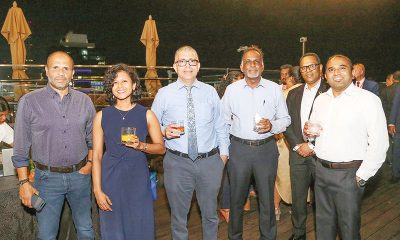
 Business5 days ago
Business5 days agoMembers’ Night of the Sri Lanka – Russia Business Council of The Ceylon Chamber of Commerce
-
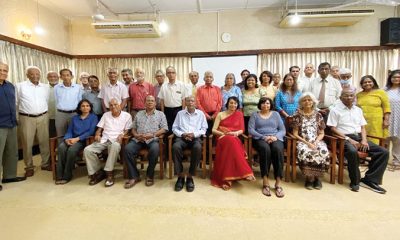
 Features5 days ago
Features5 days agoMinds and Memories picturing 65 years of Sri Lankan Politics and Society
-

 News6 days ago
News6 days agoLankan security forces Humanitarian Assistance and Relief Team working in Myanmar



